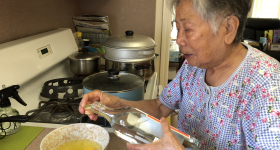hyperbaric oxygenation: the administration of oxygen at greater than normal atmospheric pressure. The procedure is performed in specially designed chambers that permit the delivery of 100% oxygen at atmospheric pressure that is three times normal. … Factors limiting the usefulness of hyperbaric oxygenation include the hazards of fire and explosive decompression. … Also called hyperbaric oxygen therapy.
—Mosby’s Medical Dictionary, 9th edition (2013)
THE INCIDENT
Miracle Creek, Virginia
Tuesday, August 26, 2008
MY HUSBAND ASKED ME TO LIE. Not a big lie. He probably didn’t even consider it a lie, and neither did I, at first. It was such a small thing, what he wanted. The police had just released the protesters, and while he stepped out to make sure they weren’t coming back, I was to sit in his chair. Cover for him, the way coworkers do as a matter of course, the way we ourselves used to at the grocery store, while I ate or he smoked. But as I took his seat, I bumped against the desk, and the certificate above it went slightly crooked as if to remind me that this wasn’t a regular business, that there was a reason he’d never left me in charge before.
Pak reached over me to straighten the frame, his eyes on the English lettering: Pak Yoo, Miracle Submarine LLC, Certified Hyperbaric Technician. He said — eyes still on the certificate, as if talking to it, not to me —
“Everything’s done. The patients are sealed in, the oxygen’s on. You just have to sit here.” He looked at me. “That’s it.”
I looked over the controls, the unfamiliar knobs and switches for the chamber we’d painted baby blue and placed in this barn just last month. “What if the patients buzz me?” I said. “I’ll say you’ll be right back, but —”
“No, they can’t know I’m gone. If anyone asks, I’m here. I’ve been here the whole time.”
“But if something goes wrong and —”
“What could go wrong?” Pak said, his voice forceful like a command. “I’ll be right back, and they won’t buzz you. Nothing will happen.” He walked away, as if that was the end of the matter. But at the doorway, he looked back at me. “Nothing will happen,” he said again, softer. It sounded like a plea.
As soon as the barn door banged shut, I wanted to scream that he was crazy to expect nothing to go wrong on this day, of all days, when so much had gone wrong — the protesters, their sabotage plan, the resulting power outage, the police. Did he think so much had already happened that nothing more could? But life doesn’t work like that. Tragedies don’t inoculate you against further tragedies, and misfortune doesn’t get sprinkled out in fair proportions; bad things get hurled at you in clumps and batches, unmanageable and messy. How could he not know that, after everything we’d been through?
From 8:02 to 8:14 pm, I sat and said nothing, did nothing, like he asked. Sweat dampened my face, and I thought about the six patients sealed inside without air-conditioning (the generator operated the pressurization, oxygen and intercom systems only) and thanked God for the portable DVD player to keep the kids calm. I reminded myself to trust my husband, and I waited, checking the clock, the door, then the clock again, praying for him to return (he had to!) before Barney ended and the patients buzzed for another DVD. Just as the show’s closing song started, my phone rang. Pak.
“They’re here,” he whispered. “I need to stand watch, make sure they don’t try anything again. You need to turn off the oxygen when the session ends. You see the knob?”
“Yes, but —”
“Turn it counterclockwise, all the way, tight. Set your alarm so you won’t forget. 8:20 by the big clock.” He hung up.
I touched the knob marked oxygen, a discolored brass the color of the squeaky faucet in our old apartment in Seoul. It surprised me how cool it felt. I synchronized my watch to the clock, set my alarm to 8:20, and found the alarm on button. Right then, just as I started pressing the tiny nub — that’s when the DVD battery died and I dropped my hands, startled.
I think about that moment a lot. The deaths, the paralysis, the trial — might all that have been averted if I’d pressed the button? It’s strange, I know, that my mind keeps returning to this particular lapse, given my bigger, more blameworthy mistakes of that night. Perhaps it’s precisely its smallness, its seeming insignificance, that gives it power and fuels the what-ifs. What if I hadn’t let the DVD distract me? What if I’d moved my finger a microsecond more quickly, managed to turn on the alarm before the DVD died, mid-song? I love you, you love me, we’re a hap-py fam-i —
The blankness of that moment, the categorical absence of sound, dense and oppressive — it pressed in, squeezed me from all sides. When noise finally came — a rap-rap-rap of knuckles against the porthole from inside the chamber — I was almost relieved. But the knocking intensified into fists banging in threes as if chanting Let me out! in code, then into full-on pounding, and I realized: it had to be TJ’s head banging. TJ, the autistic boy who adores Barney the purple dinosaur, who ran to me the first time we met and hugged me tight. His mother had been amazed, said he never hugs anyone (he hates touching people), and maybe it’s my shirt, the exact shade of purple as Barney. I’ve worn the shirt every day since; I hand-wash it every night and put it on for his sessions, and every day, he hugs me. Everyone thinks I’m being kind, but I’m really doing it for me, because I crave the way his arms wrap around and squeeze me — the way my daughter’s used to, before she started leaning away from my hugs, her arms limp. I love kissing his head, the fuzz of his red hair tickling my lips. And now, that boy whose hugs I savor was beating his head on a steel wall.
He wasn’t crazy. His mother had explained that TJ has chronic pain from intestinal inflammation, but he can’t talk, and when it gets too much, he does the only thing he can for relief: he bangs his head, using the new, acute pain to drive out the old one. It’s like having an itch you can’t stand and scratching so hard it bleeds, how good that pain feels, except multiplied by a hundred. Once, she told me, TJ put his face through a window. It tormented me, the thought of this 8-year-old boy in so much pain that he needed to bash his head against steel.
And the sound of that pain — the pounding, again and again. The persistence, the increasing insistence. Each thud set off vibrations that reverberated and built into something corporeal, with form and mass. It traveled through me. I felt it rumble against my skin, jolting my insides and demanding my heart to match its rhythm, to beat faster, harder.
I had to make it stop. That’s my excuse. For running out of the barn and leaving six people trapped in a sealed chamber. I wanted to depressurize and open it, get TJ out of there, but I didn’t know how. Besides, when the intercom buzzed, TJ’s mother begged me (or, rather, Pak) not to stop the dive, she’d calm him down, but please, for the love of God, put in new batteries and restart the Barney DVD now! There were batteries somewhere in our house next door, only a 20-second run away, and I had five minutes to turn off the oxygen. So I left. I covered my mouth to muffle my voice and said in a low, heavily accented voice like Pak’s, “We will replace batteries. Wait few minutes,” then I ran out.
The door to our house was ajar, and I felt a flash of wild hope that Mary was home, cleaning up like I’d told her to, and finally, something would go right today. But I stepped in, and she wasn’t there. I was alone, with no idea where the batteries were and no one to help. It was what I’d expected all along, yet that second of hope had been enough to shoot my expectations high into the sky and send them crashing down. Keep calm, I told myself, and started my search in the gray steel wardrobe we used for storage. Coats. Manuals. Cords. No batteries. When I slammed the door, the wardrobe wobbled, its flimsy metal warbling and booming like an echo of TJ’s pounding. I pictured his head hammering steel, cracking open like a ripe watermelon.
I shook my head to expel the thought. “Meh-hee-yah.” I yelled out Mary’s Korean name, which she hates. No answer. I knew there wouldn’t be, but it infuriated me just the same. I yelled “Meh-hee-yah” again, louder, elongating the syllables to let them grate my throat, needing it to hurt and drive out the phantom echoes of TJ’s pounding ringing in my ears.
I searched the rest of the house, box by box. With each passing second of not finding the batteries, my frustration grew, and I thought about our fight this morning, my telling her she should do more to help — she was 17! — and her walking out without a word. I thought about Pak siding with her, as always. (“We didn’t give up everything and come to America so she could cook and clean,” he always says. “No, that’s my job,” I want to say. But I never do.) I thought of Mary’s eye-rolls, her headphones on her ears, pretending not to hear me. Anything to keep my anger activated, to occupy my mind and keep out the pounding. My ire at my daughter was familiar and comfortable, like an old blanket. It soothed my panic into a dull anxiety.
When I got to the box in Mary’s sleeping corner, I forced the criss-crossed top flaps open and dumped everything out. Teenage junk: torn tickets to movies I’d never seen, pictures of friends I’d never met, a stack of notes, the top one in a hurried scrawl — I waited for you. Maybe tomorrow?
I wanted to scream. Where were the batteries? (And in the back of my mind: Who’d written the note? A boy? Waited to do what?) Just then, my phone rang — Pak again — and I saw 8:22 on the screen and remembered. The alarm. The oxygen.
When I answered, I meant to explain how I hadn’t turned off the oxygen but would soon, and that was no big deal, he sometimes ran the oxygen over an hour, right? But my words came out differently. Like vomit — outpouring in one stream, uncontrollable. “Mary is nowhere,” I said. “We’re doing all this for her, and she’s never here, and I need her, I need her help to find new DVD batteries before TJ busts his head open.” “You always think the worst of her, but she’s here, helping me,” he said. “And the batteries are under the house kitchen sink, but don’t leave the patients. I’ll send Mary to grab them. Mary, go, right now. Take four D batteries to the barn. I’ll come in one min —”
I hung up. Sometimes it’s better to say nothing.
I ran to the kitchen sink. The batteries were there like he said, in a bag I’d assumed was trash, under work gloves covered in dirt and soot. They were clean just yesterday. What had Pak been doing?
I shook my head. The batteries. I had to hurry back to TJ.
When I ran outside, an unfamiliar scent — like charred wet wood — permeated the air and stung my nose. It was getting dark, harder to see, but I saw Pak in the distance, running toward the barn.
Mary was ahead of him, sprinting. I called out, “Mary, slow down. I found the batteries,” but she kept running, not toward the house, but to the barn. “Mary, stop,” I said, but she didn’t. She ran past the barn door, to the back side. I didn’t know why, but it scared me, her being there, and I called again, her Korean name this time, softer. “Meh-hee-yah,” I said, and ran to her. She turned. Something about her face stopped me. It seemed to glow somehow. An orange light coated her skin and shimmered as if she were standing directly in front of the setting sun. I wanted to touch her face and tell her, “You are beautiful.”
From her direction, I heard a noise. It sounded like crackling, but softer and muffled, the way a flock of geese might sound taking off for flight, hundreds of wings flapping at once to scamper skyward. I thought I saw them, a curtain of gray rippling in the wind and rising higher and higher in the dusky violet sky, but I blinked, and the sky was empty. I ran toward the sound, and I saw it then, what she’d seen but I hadn’t, what she’d run toward.
Flames.
Smoke.
The back wall of the barn — on fire.
I don’t know why I didn’t run or scream, why Mary didn’t, either. I wanted to. But I could only walk slowly, carefully, one step at a time, getting closer, my eyes transfixed by the flames in orange and red — fluttering, leaping, and switching places like partners in a step dance.
When the boom sounded, my knees buckled and I fell. But I never took my eyes off my daughter. Every night, when I turn off the light and close my eyes for sleep, I see her, my Meh-hee, in that moment. Her body flings up like a rag doll and arcs through the air. Gracefully. Delicately. Just before she lands on the ground with a soft thud, I see her ponytail, bouncing high. The way it used to when she was a little girl, jumping rope.
Excerpted from MIRACLE CREEK: A Novel by Angie Kim. Published by Sarah Crichton Books, an imprint of Farrar, Straus and Giroux, April 16th 2019. Copyright © 2019 by Angela Suyeon Kim. All rights reserved. For more information, please visit https://us.macmillan.com/books/9780374156022.










Comments